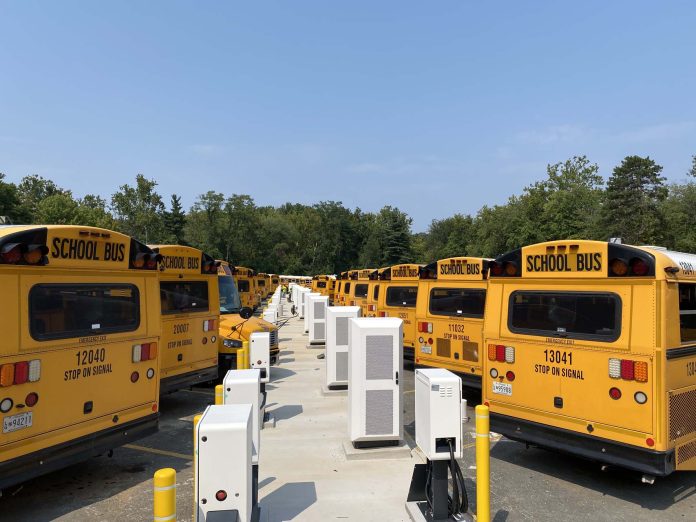Lawmakers are pushing the potential benefits of vehicle-to-grid (V2G) technology, and several bills federally and at the state level are calling attention to the capabilities.
For instance, HB3180 and SB1548, introduced by several Democrat sponsors in Congress, are calling on U.S. Secretary of Energy Jennifer Granholm to establish a program to encourage the deployment of electric school buses and V2G technologies and applications.
Sen. John Hickenlooper and Rep. Jason Crow of Colorado stated in a release that the Bus Integration Dedicated to Improving Resilience, Eliminating Congestion, and Triggering Innovation Over Numerous Applications and Localities (BIDRECTIONAL) Act would create a program to equip school buses with the bidirectional energy flow to make V2G a reality.
California already requires all school bus purchases using state grant funds to have bidirectional capability for eventual V2G usage. However, the state recently introduced a new bill requiring all school buses sold to be V2G capable by 2030.
Meanwhile, Hickenlooper’s and Crow’s bill states that school buses are ideal for V2G applications because they have large batteries, sit idle for long periods of time, have set predictable routes, and operate in fleets.
“V2G buses help back up our grid, require less maintenance, and ensure cleaner air for our kids,” said Hickenlooper, who introduced a similar bill last year.
Meanwhile, Crow added that, “Colorado was among the first in the nation to lead a successful pilot program that returns energy from electric school buses back to our power grid. Now is the time to bring our homegrown innovation to scale.
“I look forward to advancing this legislation to save energy, reduce costs, and expand access to clean, renewable energy that will protect our environment for generations to come.”
V2G, however, still needs to be proven nationwide. While a three-year V2G electric school bus project in New York state determined the technical and economic viability of using school buses to support the grid, other challenges remain, such as the upfront price of the electric school bus.
Related: V2G Findings Announced From New York State Electric School Bus Project
School transportation leaders have shared that while buses may be ready for V2G capabilities, many utilities aren’t. Purchasing a school bus with the bidrectional charge technology only increases the price. Instead, some fleet managers and other electric advocates advise checking with utilities first to see if the technology is even available and a rate structure is in place.
Additionally, anecdotal evidence from several fleet managers School Transportation News has spoken with indicates that plugging school buses into the grid overnight at least initially can deplete their batteries and render the vehicles with no charge for morning routes.
Still, Hickenlooper’s and Crow’s bill is supported by Accelera by Cummins, Blue Bird, bp Pulse Fleet, Highland Electric Fleets, Lion Electric Company, Nuvve, Proterra, Xcel Energy and more.
HB3180 was introduced on May 10 and was referred to the House Committee on Energy and Commerce. SB1548 was also introduced the same day and has since been referred to the Committee on Energy and Natural Resources.
State Approaches
California’s SB 233, introduced on Jan. 24 by state Sen. Nancy Skinner, looks to establish similar legislation.
The bill would amend existing law, which currently requires the State Energy Resources Conservation and Development Commission along with the California Air Resources Board (CARB) and the Public Utilities Commission to prepare a statewide assessment of electric vehicle charging infrastructure needed to support the levels of electric vehicle adoption needed to meet the state goals of at least 5 million zero-emission vehicles on the road by 2030.
Existing law also requires CARB, along with the California Energy Commission (CEC), to develop and administer a program to provide grants to individuals, local governments, public agencies, nonprofit organizations, and private businesses to help with the purchase or lease of zero-emissions vehicles.
However, this newly introduced bill would speed up that process. It would require the CEC in consultation with CARB to analyze challenges and opportunities with using an electric vehicle as a mobile battery to power a home or building and requires the submission of their findings to the governor and legislature. The report would include information relating to the bidirectional capability of electric vehicles and electric vehicle service equipment. The report would need to be submitted by Jan. 1, 2026.
Related: Federal Legislation Looks to Promote V2G for Electric School Buses
Related: First West Coast School Bus V2G Pilot Project to Begin
Related: Green Bus Summit Comes to STN EXPO Indy
Related: Collaboration Key When Purchasing Electric School Buses, Say Student Transporters
The bill would also require all model-year 2030 and later electric vehicles sold in California to be bidirectionally capable. This would include light-duty vehicles and school buses, except as exempted by the state board.
SB233 passed the state Senate last month and is currently in the Assembly.
Meanwhile, the Maine House and Senate passed Legislative Document 519 on June 6 to establish a pilot project for V2G school buses in the Wells-Ogunquit Community School District.
By Jan. 15, 2024, program administrator Efficiency Maine Trust must submit an assessment of the pilot project and include recommendations regarding its feasibility, and whether the trust recommends implementing a V2G electric school bus project. The Trust is also responsible for providing a completed prosed project design and budget.














